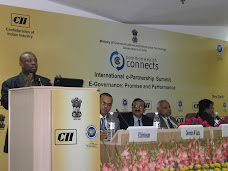Review of Torres, Lourdes, Vicente Pina and Basilio Acerete (2005): E-Government and E-Governance Developments in EU Cities Reshaping Government Relation to Citizens
Torres et al. (2005)* report that "ICTs have not had a dramatic impact on the practical reality of present politics. The Internet represents an aid to good governance by increasing government transparency, efficiency, and customer-oriented service delivery, but it is not running, in most cases, as an important medium facilitating citizen consultation, policy discussion, or other aspects of citizen participation in the policymaking process." Their study shows that "technology is behaving as an enabler within pre-existingsocial structures and political functions. In the European continental countries the application of ICTs to service delivery has little effect on the traditional administration style of their countries. Furthermore, there is a systematic bias in local government ICT policy which not only confirms existing emphases upon service provision but also sustains and enhances it."
Their findings are based on a comprehensive study of the nature of e-governance initiatives by 35 cities with more than 500,000 inhabitants in 12 European countries - Austria, Belgium, France, Germany, Greece, Ireland, Italy, Luxembourg, The Netherlands, Portugal, Spain and the UK, which represent around 80 per cent of EU population. Their empirical survey focuses on "e-services and e-democracy together with the web maturity." The study was carried out "during the second half of 2003 and the first half of 2004and a range of 173 items of information were analysed, 67 services delivered through the Internet were identified and grouped according to the local public service classification carried out by Torres and Pina as well as 67 e-democracy features and 6 web maturity items.This is an important study, which should not be missed by any one interested in e-governance.
Torres et al. need to be complimented for not only undertaking this comprehensive cross-country study but for drawing clear conclusions which have important lessons of practical utility for e-governance policy-makers and implementers worldwide. Their conclusion, for example, "At present most e-government initiatives are still viewing people from a passive perspective -to whom something is given or from whom something is required-, and not as citizens" rings true as the state and citizens continue to co-exist in mutual discomfort. As the potential of e-governance continues to be unrealized worldwide, the study implies need for re-orientation of e-governance strategies to serve the citizens better. The authors rightly emphasise that "The jump fromadministratively oriented towards user-oriented organizations requires to give citizens the opportunity to influence and mould information which only transact level permits." E-Governance, it appears, has a long way to go.Dr
D.C.Misra
June 5, 2005
___________________________________________________________________________________
*Torres, Lourdes, Vicente Pina and Basilio Acerete (2005): E-Government and E-Governance Developments in EU Cities Reshaping Government Relation to Citizens, Zaragoza, Spain, University of Zaragoza, Faculty of Economics and Business Administration, Department of Accounting and Finance, Paper presented at the 28th European Accounting Association Annual Congress, Göteborg, May18-20, 2005, available http://www.uc3m.es/uc3m/dpto/EMP/seminar/torres.pdf(accessed: June 5, 2005)
Sunday, June 05, 2005
Subscribe to:
Post Comments (Atom)






























No comments:
Post a Comment